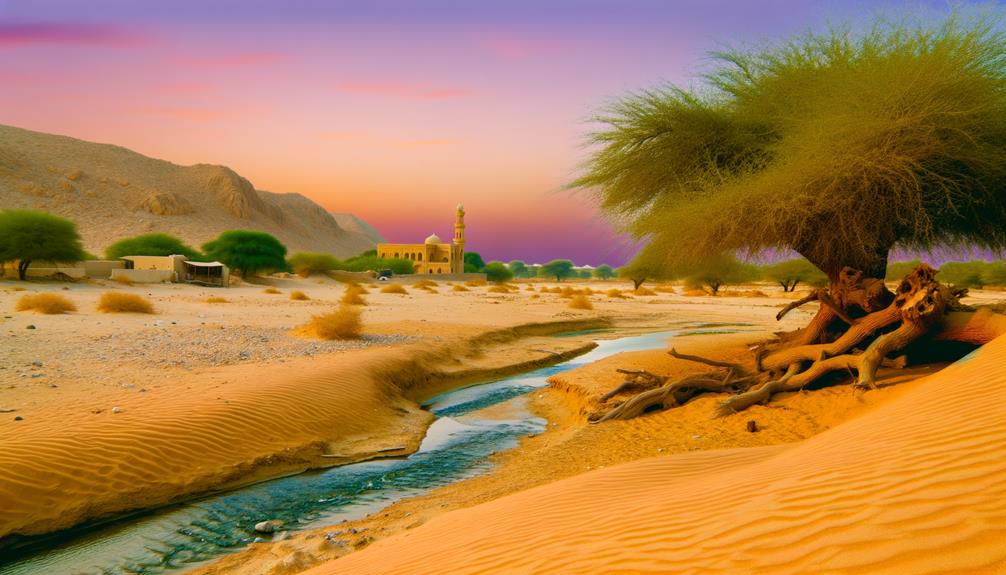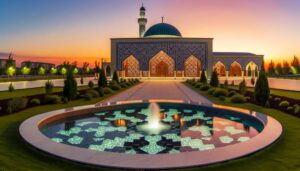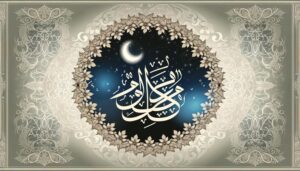Meaning of Name Noah in Islam
In Islam, the name Noah, or Nuh in Arabic, is profoundly significant. It represents unwavering faith, divine guidance, and moral integrity.
Prophet Noah is revered as a messenger chosen by Allah to guide humanity away from idolatry and moral decay. His story, prominently detailed in Surah Noah (71), underscores themes of repentance, steadfastness, and resilience.
Symbolically, Noah's name embodies the principles of divine intervention, trust, and obedience to God's will. Exploring further illuminates how his life offers enduring ethical and spiritual lessons that resonate deeply within Islamic teachings.

Key Takeaways
- Represents unwavering belief and divine guidance.
- Signifies a covenant between humanity and the Divine.
- Reflects obedience to God's will.
- Symbolizes divine intervention and protection.
- Embodies timeless ethical and spiritual principles.
Qur'anic References to Noah
The Qur'an mentions the prophet Noah in several verses, highlighting his role as a messenger and emphasizing his unwavering faith amidst widespread disbelief. Noah is central to Islamic teachings, appearing mainly in Surah Noah (71), where his efforts to guide his people are meticulously detailed.
The Qur'anic narrative underscores Noah's persistent warnings about the consequences of idolatry and moral deviation. Despite enduring ridicule and rejection, Noah's steadfastness exemplifies the virtues of patience and conviction.
Additionally, other Surahs such as Al-A'raf (7:59-64) and Hud (11:25-49) recount his life, further enriching his portrayal as a paragon of prophetic duty. These references collectively illuminate Noah's exemplary character and the broader moral and theological lessons inherent in his story.
Noah's Prophethood in Islam
Noah's prophethood in Islam represents one of the earliest and most significant examples of divine guidance and moral rectitude. As a prophet, Noah (Nuh in Arabic) is revered for his unwavering faith and patience in the face of widespread disbelief and moral decay. His mission was to call his people to monotheism and righteous living, a task he pursued with relentless determination despite enduring mockery and defiance.
- Divine Messenger: Noah was chosen by Allah to deliver the message of monotheism.
- Perseverance: His long-term dedication exemplifies steadfastness in faith.
- Moral Lessons: Noah's story imparts lessons on obedience and moral integrity.
- Universal Message: His prophethood underscores themes of repentance and divine mercy.
Noah's legacy in Islam continues to be a powerful symbol of faith and perseverance.
Symbolism of Noah's Name
In Islamic tradition, the name ‘Noah’ (Nuh in Arabic) carries profound symbolic meaning, encapsulating themes of faith, resilience, and divine guidance. Noah’s story, as narrated in the Quran, serves as a powerful allegory for unwavering belief in the face of adversity. His dedication to spreading God’s message, even amidst widespread rejection, underscores the importance of perseverance. Noah’s unwavering determination to fulfill his divine purpose, despite the challenges he faced, serves as an inspiration for Muslims striving to uphold their faith in the modern world. The name ‘Noah’ (Nuh in Arabic) thus carries the weight of this symbolic significance, reminding believers of the strength and fortitude required to stay steadfast in their beliefs. This resilience and dedication in the face of opposition is the meaning of Asher in Islam.
The name 'Noah' symbolizes a covenant between humanity and the Divine, reflecting God's mercy and the importance of obedience to His will. Additionally, Noah's construction of the ark represents divine intervention and protection, reinforcing the idea that true faith can lead to salvation. In this way, Noah's name transcends its historical context, embodying timeless spiritual and ethical principles.
Lessons From Noah's Life
Examining Noah's life within the Islamic tradition reveals profound lessons on steadfastness, divine trust, and moral integrity. Noah's unwavering commitment to his mission, despite facing relentless opposition, exemplifies resilience.
His trust in Allah's plan, even when it entailed building an ark on dry land, underscores deep faith. Additionally, Noah's life serves as a reminder of the importance of moral integrity in the face of widespread immorality.
Key lessons from Noah's life include:
- Steadfastness: Remaining committed to one's mission regardless of external challenges.
- Divine Trust: Placing unwavering faith in Allah's guidance and commands.
- Moral Integrity: Upholding ethical standards even when surrounded by corruption.
- Patience: Enduring prolonged periods of trial with perseverance and hope.
Noah in Islamic Literature
Within Islamic literature, the story of Noah is recounted with rich detail and serves as a significant source of theological and moral reflection. The Qur'an narrates Noah's mission to guide his people towards monotheism, emphasizing his patience and perseverance.
Noah's unwavering faith amid widespread rejection and mockery highlights the trials faced by prophets. His construction of the Ark, as commanded by Allah, and the subsequent deluge illustrate divine justice and mercy. The story underscores themes of faith, obedience, and divine retribution.
Islamic exegeses further expand on Noah's role, portraying him as a paragon of steadfastness. His narrative is meticulously detailed in Surah Nuh, providing profound insights into the virtues of resilience and unwavering devotion to God.
Cultural Impact of Noah
In Islamic tradition, Noah (Nuh in Arabic) is venerated as a prophet who exemplifies unwavering faith and perseverance, profoundly shaping religious narratives and practices.
His story has also deeply influenced Islamic art, inspiring a range of artistic expressions from classical calligraphy to contemporary visual arts.
This cultural impact underscores Noah's enduring relevance and the deep respect he commands in the Muslim world.
Noah in Islamic Tradition
The cultural impact of Noah in Islamic tradition is profound, influencing religious practices, literature, and communal values across Muslim societies. Revered as a prophet who exemplified steadfast faith and resilience, Noah's story is deeply embedded in Islamic teachings. His narrative is often invoked to underscore the themes of divine justice and human accountability, fostering a collective moral consciousness.
- Religious Practices: Noah's perseverance is cited in sermons to inspire patience and trust in divine wisdom.
- Literature: Islamic texts frequently reference Noah's trials, enriching religious discourse.
- Communal Values: His story promotes unity and collective responsibility in facing societal challenges.
- Moral Lessons: Noah's unwavering faith serves as a paradigm of obedience to God, encouraging ethical behavior.
Noah's Influence on Art
Noah's lasting impact in Islamic tradition extends beyond religious and communal spheres, deeply shaping artistic expressions across various mediums. His story has been a rich source of inspiration, influencing Islamic art, literature, and architecture. The tale of Noah's Ark, symbolizing salvation and divine guidance, is depicted in illuminated manuscripts, calligraphy, and decorative arts. This narrative also finds resonance in contemporary artistic endeavors, encapsulating universal themes of faith and perseverance.
| Medium | Cultural Impact |
|---|---|
| Illuminated Manuscripts | Rich depictions of Noah's story |
| Calligraphy | Artistic renditions of Quranic verses on Noah |
| Decorative Arts | Symbolic motifs inspired by Noah's Ark |
| Contemporary Art | Modern interpretations of Noah's themes |
Such artistic representations serve as a testimony to Noah's profound influence on Islamic culture.
Noah's Legacy in Modern Times
In contemporary contexts, Noah's legacy persists through his representation as a symbol of environmental stewardship, highlighting the imperative to protect and preserve natural resources.
Additionally, his story serves as a source of inspiration across various faiths, fostering interfaith dialogue and unity.
This dual significance underscores Noah's enduring relevance in addressing modern challenges and promoting collective human values.
Environmental Stewardship Symbolism
As contemporary society grapples with environmental challenges, the story of Noah emerges as a profound symbol of stewardship and responsibility towards the Earth. In Islamic tradition, Noah's dedication to preserving life during the great flood can be interpreted as a call for environmental consciousness in modern times. This narrative underscores the importance of safeguarding natural resources and maintaining ecological balance.
- Preservation of Species: Noah's Ark symbolizes the duty to protect biodiversity.
- Sustainable Living: His actions highlight the need for sustainable practices.
- Moral Responsibility: Demonstrates ethical obligations towards the environment.
- Resilience and Adaptation: Encourages adaptation to changing environmental conditions.
Analyzing Noah's legacy through this lens offers valuable insights into contemporary environmental stewardship, reinforcing the timeless relevance of his story.
Interfaith Inspirational Figure
Renowned across multiple religious traditions, Noah stands as an inspirational figure whose legacy continues to foster interfaith dialogue and cooperation in modern times. His story, shared across Islam, Christianity, and Judaism, underscores the universal themes of faith, perseverance, and moral integrity. These shared values offer a unique platform for interfaith engagements, encouraging mutual respect and understanding. The table below highlights Noah's significance in key religious texts:
| Tradition | Text Reference |
|---|---|
| Islam | Quran, Surah 11:25-49 |
| Christianity | Bible, Genesis 6-9 |
| Judaism | Torah, Bereshit 6-9 |
Noah's enduring legacy promotes ethical reflection and collaboration, emphasizing shared human experiences over religious divides. This collective reverence for Noah enhances efforts towards global peace and unity.
Conclusion
In the vast tapestry of Islamic tradition, Noah stands as a monumental figure whose story offers boundless wisdom and inspiration. The Qur'anic references, the profound lessons from his prophethood, and the rich symbolism of his name contribute greatly to understanding faith, perseverance, and divine guidance.
His enduring legacy permeates Islamic literature, culture, and modern interpretations. Noah's narrative serves as an eternal beacon, guiding humanity through the tempestuous waters of life's challenges.






